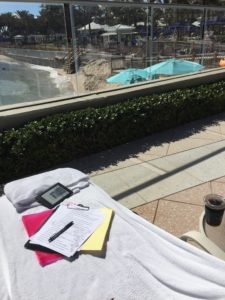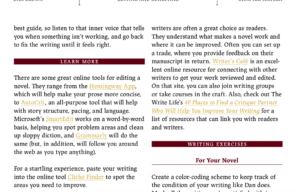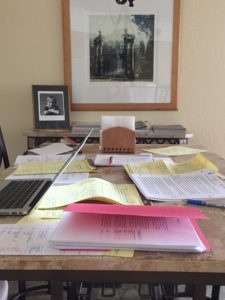
Would you watch an online class if bestselling Da Vinci Code author Dan Brown was teaching how to write a thriller? If you’re trying to write one, my bet is you’d sign up pronto. I did. Yes, I did — even though you’d think I should have some idea of how to write one by now. After all, I’m just two weeks away from submitting a revised manuscript for Book3 to my editor.
Still, when I saw that Dan Brown (250 million copies of his books sold in 56 languages world wide) signed up to teach a MasterClass online (5 hours, 19 lessons, $90) I just had to do it. If nothing else, I figured it would provide me with a final checklist of everything I should have covered.
First Lesson

So, I plowed into my first lesson. I went straight to chapter sixteen, Editing and Rewriting. Dan starts this section by telling you that “a good writer knows when he/she is bad.” He adds: “the most important skill is to know when you’re bad.”
I kinda know this already because Story guru, Robert McKee told me as much a couple of years ago. Dan tells you how to fix this sorry state of affairs through two stages of editing. During the first stage, you edit as you write “but don’t fix something to death.”
The second stage involves bringing a fresh perspective to your writing: You put aside your finished manuscript for a while, maybe a week maybe a month. Then, you print it out, and take it to read outside somewhere, on a beach or in the sun, “the way a reader might,” says Dan.
Yessss!!!!! I can’t wait for this stage. I’m just about a week away from it. In the sun, is mostly where I like to mark up my edits, but I can’t re-write lying on the beach — and there’s been quite a bit of re-writing to do over the last couple of weeks. I can’t wait to be at the stage where Dan considers an author is done which is “when I read a chapter and I don’t trip over anything.”
What Makes A Thriller
 When I’ve finished Dan’s editing section, I go back to the beginning of the course. Dan covers just about everything that makes a story a thriller. His own “hack” is the Three Cs: Contract, Clock and Crucible.
When I’ve finished Dan’s editing section, I go back to the beginning of the course. Dan covers just about everything that makes a story a thriller. His own “hack” is the Three Cs: Contract, Clock and Crucible.
Contract, he says is the promises you make to the reader to answer the Big Dramatic Question, and all the smaller questions that arise as you go along. A thriller is a patchwork of promises. “Keeping a reader’s attention means making promises (if you stick with me, I’ll answer all the questions)– and fulfilling them.” Specifically, what makes a book a thriller is the “pace at which promises are kept.”
Dan makes a really interesting aside here, revealing that just before Da Vinci Code was about to go to press, his editor found 17 unanswered questions. That, of course, it what makes editors worth their weight in gold (You know who you are, Helga.)
Clock refers to the time pressure in a story. Dan says he likes his stories to be confined to one 24-hour period. Crucible is what “forces the characters to act.” Says Dan, think of Jaws. Characters in a small boat have to fight and kill the shark. “The hero only has one path. There is nowhere else to go. No escape, but to act.”
Dan Shows How
 What makes this MasterClass particularly brilliant is that Dan Brown imparts specific, detailed knowledge and provides writers with the most practical tools. On dialog, for example, he says: that dialog has two functions: conflict (there is no point in having a conversation where two characters agree on everything. Boring!) and revelation. An author should always ask him/herself: “Why is this character talking?”
What makes this MasterClass particularly brilliant is that Dan Brown imparts specific, detailed knowledge and provides writers with the most practical tools. On dialog, for example, he says: that dialog has two functions: conflict (there is no point in having a conversation where two characters agree on everything. Boring!) and revelation. An author should always ask him/herself: “Why is this character talking?”
On research, he makes the point that, in the past, authors have been given advice such as “write what you know” — which is not useful advice. “Write what you want to know,” he says. “Choose a world you’re excited about, and go educate yourself.” It’s easy in the age of the Internet.
One tip on research includes going to the experts in the particular world an author chooses for his backdrop. “You’ll be amazed how eager people are to talk about their passions,” he says.
Dan is 100 per cent right. I have always found that people who have expertise about a subject are more than happy to share it with a novelist ( as opposed to, say, answering questions for a tabloid journalist!!!) But, as Dan warns, go prepared. He says, “first I will do a lot of reading so that I know the questions to ask.”
From Idea to Ending
On characters: “Start with your villain because the villain is the catalyst for everything. You define your hero through the villain.” He also points out that “villains are more interesting when they operate in a moral gray area. Think in terms of the villain doing the wrong thing for the right reasons.”
On building a story from the ground up. This is Chapter Ten, and it’s a particularly amazing chapter where Dan shows step-by-step how to construct a thriller using all the elements that need to be in a story which he seemingly makes up on the spot. And, write the ending first. You know that in a thriller, the hero will always win, but “your job is to make him win in a way you don’t see coming.”
Most Useful (For Me)
 On creating suspense: Dan points to one of the most important tools for an author — withholding information. “Know where to cut your scenes/chapters. End a chapter before a revelation.” I used this advice and went back through my manuscript to find chapters where I could cut even earlier than I was already cutting.
On creating suspense: Dan points to one of the most important tools for an author — withholding information. “Know where to cut your scenes/chapters. End a chapter before a revelation.” I used this advice and went back through my manuscript to find chapters where I could cut even earlier than I was already cutting.
Look over the printed pages to gauge the mix of exposition and dialog. If you have six pages of solid type, you have too much exposition.
Check chapter openings to make sure you’ve pulled in the reader quickly enough.
An unbeatable bonus of this class is the workbook which includes links to more reading and viewing materials. There is also the opportunity to join in an online discussion with other class members, and a chance to have your specific question answered by Dan during “office hours.”
The Basics, Too

Dan addresses all the basics, too: the importance of writing at the same time of day every day, and of having a space where you have the privacy to create. But the space doesn’t need to be perfect. You don’t need the “perfect chair, or the perfect flowers.” He adds that he wrote The Da Vinci Code in his parents’ laundry room in their Florida house “with the dryer going while I wrote.”
MasterClass is a series of online courses in which real masters of their craft teach how you too can be, among other things, a bestselling author (Dan Brown and James Patterson), creative writer (Margaret Atwood,) TV writer (Shonda Rhimes,) screenwriter (Aaron Sorkin,) photographer (Annie Leibovitz,) chef (Gordon Ramsay) and tennis player (Serena Williams.)
I’m working my way through this class myself. Couldn’t pass up the opportunity to learn from such a successful writer. I also enjoyed the Margaret Atwood class. She was quite a teacher!
Hi Eldon, so much to unpack in this class, isn’t there? It’s one thing to be a super successful thriller author, it’s quite another to be able to teach how to write thrillers. Dan Brown really is a great teacher. I loved this MasterClass!
I still need to finish it but already I can tell he’s a great teacher. The Master Class is well worth the money.
Let me know what you think when you’re done with the class, Eldon!